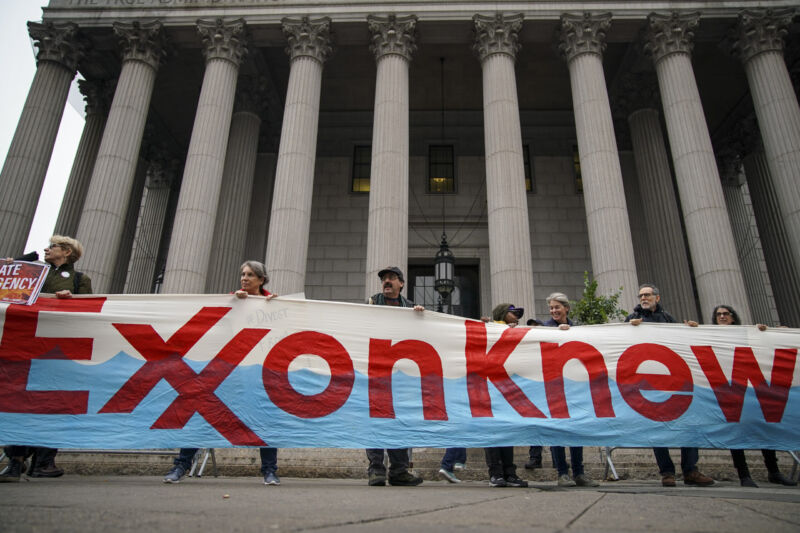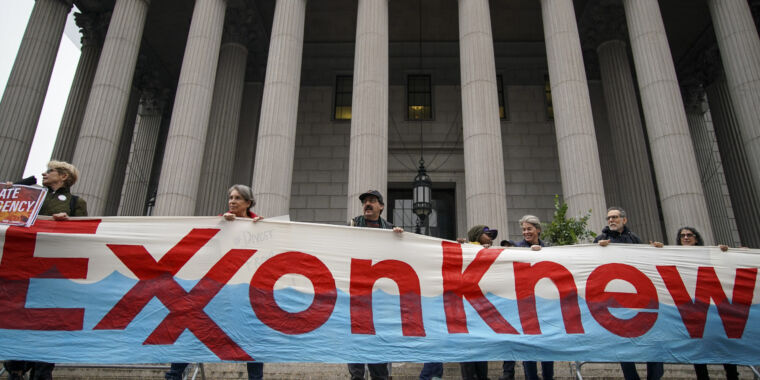
Drew Angerer/Getty Images
ExxonMobil has been the main target of activists and politicians outraged by the oil industry’s efforts to block action on climate change. Now, newly revealed documents confirm that the oil company’s reputational problems have spread to the industry itself and threaten to derail Exxon’s largest climate proposal to date.
Last year, Exxon struggled to get support from its peers when it proposed a cross-industry initiative to build a carbon capture and storage hub in Houston, according to documents released by the House Committee on Oversight and Reform, which has been investigating the oil industry. In particular, top executives at Shell feared that joining Exxon would pose an “unacceptable risk” to the reputation of the European oil company.
“I am not interested in participating in advocacy led by Exxon,” Krista Johnson, Shell’s head of U.S. government relations, wrote in a July 2021 email to Shell USA president Gretchen Watkins. Johnson said their competitor continued to make negative headlines and that “zero companies” were willing to join an Exxon-led consortium at the time.
A month later, Watkins said she was against any public involvement with Exxon. “Their reputation here has been badly damaged,” she wrote to colleagues in the Netherlands, where Shell’s headquarters were located at the time, “and we will only harm the strength of Shell’s American reputation.” (Shell later moved its headquarters to London.)
In April 2021, Exxon proposed a $100 billion public-private partnership to build what would become the world’s largest carbon capture and storage “hub” in Houston. The plan was to install equipment to remove carbon dioxide from smokestacks in the region’s largest power plants, refineries and other industrial operations before it reached the atmosphere. The gas would then be compressed and piped to wells drilled under the Gulf of Mexico where it would be injected underground for permanent storage. The company said the effort could eventually prevent up to 100 million tons of carbon emissions per year by 2040, but would require the region’s biggest corporate emitters to participate.
The proposal has drawn significant skepticism and criticism from environmentalists, who say carbon capture is unlikely to ever reach the scale proposed by Exxon. They have warned that government subsidies for the technology would be a waste of climate finance, and have argued that Exxon used carbon capture to polish its image, rather than incentivize real emissions reductions.
The documents suggest that some in the oil industry shared these concerns, even as they supported carbon capture and storage as a climate solution.
Watkins said in her August 2021 email “I fully support our commitment” to potential carbon capture investments in the United States, but advised to stay away from Exxon’s public announcement. She feared Exxon was trying to improve its image by appearing alongside Shell, she wrote, ahead of a possible congressional hearing where oil executives could testify.
Another email, from Marnie Funk, a senior government relations adviser at Shell, said Chevron was “divided internally” over whether to join Exxon’s efforts, with “some minor discomfort in some Chevron neighborhoods about Exxon’s reputational problems.”
Funk also said that Chevron viewed Exxon’s claims about how much carbon dioxide the project could capture and how many jobs it could create as “inflated, but harmless inflation.”
Chevron and Shell declined to comment on this article.
The emails say that Exxon executives called all of the top oil and chemical companies in the Houston area to make them publicly pledge their support for the carbon capture proposal. The effort was backed by 11 companies, including Chevron, who released a joint statement in September 2021. Shell initially refused to participate, but in January it apparently was convinced and publicly announced its support.
According to Funk’s email, the September announcement was meant to be the “first step” of an industry campaign to secure an expanded federal carbon capture tax credit and new regulations that would allow companies to inject CO2 under the Gulf of Mexico.
The Houston hub was “entirely dependent” on securing these changes, Funk wrote, and the industry lobbying campaign was ultimately successful on both fronts. The carbon capture tax credit has been expanded this year by the Inflation Reduction Act, and the Department of the Interior is in the process of establishing rules for carbon dioxide storage under federal waters.
The only Houston oil company not participating in the effort was BP, which declined to comment on this article.
The documents were released earlier this month as part of an investigation by the House of Representatives committee into the oil industry’s alleged campaign to spread disinformation about climate change. They were accompanied by a memo that said: “These documents show how the fossil fuel industry has ‘greenwashed’ its public image with promises and actions that oil and gas executives knew would not meaningfully reduce emissions, even when the industry moved aggressively to sustained fossil fuel production for decades to come.” The memo was supposedly the final act of the investigation before Republicans take control of the House next year, when they are expected to curtail the committee’s work.
Todd Spitler, an Exxon spokesperson, declined to comment on Shell’s internal discussions, but said in an email: “The House Oversight Committee report sought to misrepresent ExxonMobil’s position on climate science and its support for effective policy solutions. through well-intentioned, internal policy debates as an attempted disinformation campaign by the company.” He added: “Our CEO has testified under oath on this issue at two all-day congressional hearings before two separate committees. We have been in regular contact with the committee for over a year and have provided staff with over a million pages. of documents, including board materials and internal communications.”
In addition to the drama between companies, the documents released by the commission also shed light on the oil industry’s ongoing efforts to advance carbon capture and storage. For years, the documents show, companies viewed the technology as a means to enable the use of fossil fuels, even as the world’s transition to cleaner energy became more urgent. But the only way carbon capture could succeed, the companies said, was to secure substantial government funding and public support.
In 2016, for example, a BP-sponsored program at Princeton University sent the company advice on how to tackle climate change. One of the recommendations was to understand “the potential of CCS” or carbon capture and storage “to enable the full use of fossil fuels in the energy transition and beyond.”
A 2017 Shell document titled “U.S. Gulf Coast CCS Opportunity Framing” stated that “the window for CCS to remain relevant to governments and society is rapidly closing”, and that action was needed within a decade. “The value of CCS to Shell is the ability to decarbonise our products, maintain greater market share for our products in the energy transition, in addition to reputational value,” the company said.
Two years later, a memo to Shell’s executive committee wrote that CO2 capture in the United States faced “economic challenges” but that the company would continue to pursue a Gulf Coast project due to the possibility of future incentives and the “potential need for CCS on critical Shell projects.”
The documents also include a 2018 update to a National Petroleum Council report on carbon capture and storage written by John Mingé, a former BP America chief who led the Petroleum Council study. In addition to lowering emissions, the document said, broad deployment of carbon capture technology could help increase U.S. oil production, secure fossil fuel exports to countries with strict climate policies, and increase the use of “existing infrastructure in the long term” possible.
Mingé’s update recommended “simplifying the narrative” about carbon capture as part of an effort to gain support for the technology in academia, environmental groups, governments and the financial sector.
The Petroleum Council report, published in December 2019, has become a foundational document for industry lobbying over the past two years. In that period, Congress and the Biden administration have allocated more money to carbon capture than any other administration in history.
Nicholas Kusnetz is a reporter for Inside Climate News. Prior to joining ICN, he worked at the Center for Public Integrity and ProPublica. His work has won numerous awards, including from the American Association for the Advancement of Science and the Society of American Business Editors and Writers, and has appeared in more than a dozen publications, including The Washington Post, Businessweek, The Nation, Fast Company and The New York Times. You can reach Nicholas at [email protected].
This story originally appeared on Inside Climate News.

